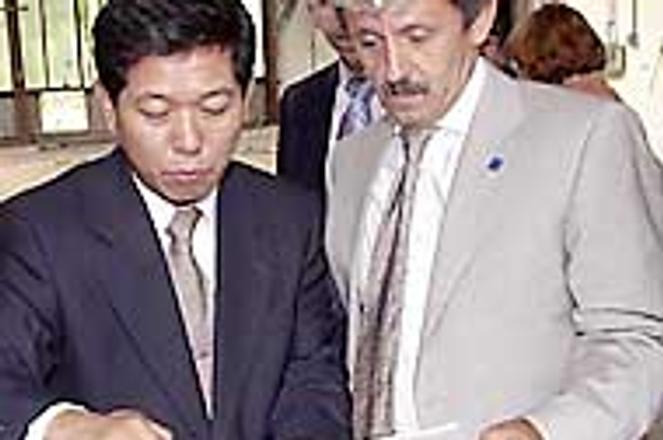SAMSUNG Hungary boss Kyu Dam Cho (centre) with PM Dzurinda.photo: TASR
AS PART of its programme of global expansion, South Korea's Samsung conglomerate is shifting its European manufacturing focus from western to central Europe, and from October will begin making computer monitors and televisions in Slovakia
While closing plants in Spain and Britain, in early August Samsung officials announced the purchase of the factory area of defunct furniture producer ZNZ in the southern Slovak town of Galanta with an eye to making 200,000 monitors by year's end, expanding to 1.5 million in 2003.
"In computer monitors we are number one world-wide, which means this factory has quite an important position in the Samsung organisation," said Ivan Škula, head of Samsung Electronics Slovakia, a 100 per cent subsidiary of Samsung Hungary.
Samsung has been increasing its activity in central Europe through its existing Hungarian operation as well as looking for new possibilities. While the company had also been considering Romania as a possible destination for its monitor facility, ultimately, say company and government officials, Slovakia offered better conditions.
"Important factors in their decision included if there is an available labour force, if that labour force is well-educated and reliable, and if the town is able to secure an advantageous area for the plant. Maybe in Romania they were not able to offer all the conditions that were here," said head of the Galanta district state office László Pomothy.
"One factor that was very important was that the attitude of locals was very positive. We were very welcoming to them, so that all the conditions were fulfilled - all the authorities have been and will be at their disposal during the construction and afterwards, so their plans can be finished on time," he continued.
Škula said that employment at the plant should reach 600 by the end of this year, rising to 2,000 in 2003, welcome news for the Galanta district, which at nearly 20 per cent has the highest unemployment rate in the western Trnava region. While Trnava region's unemployment rate was 14.6 per cent, Slovakia's country-wide unemployment rate stood at 17.6 per cent in July.
Škula also saw benefits from the operation beyond direct employment. "Samsung is bringing job opportunities and technologies; we are also bringing know-how. I also expect we will be cooperating with universities and technical schools in Slovakia," he said.
While Samsung officials declined to comment on concrete investment incentives they had been offered by the Economy Ministry, saying that negotiations were still in progress, Slovakia is expected to build a new bypass road to the factory, allowing trucks to avoid Galanta's town centre.
Although Samsung has already had one unsuccessful foray into Slovakia with the bankrupt refrigerator maker Calex in the southern Slovak town of Zlaté Moravce, the company emphasises that this operation will be entirely different.
In 1991, Calex bought an expensive set of equipment for producing refrigeration compressors from Samsung. After receiving a state guarantee on a Sk6 billion (then over $200 million) loan, Calex and Samsung set up a joint venture, but the Korean giant pulled out of the project in late 1996 and Calex soon went into receivership.
Following Samsung's exit, Calex creditors and the Slovak government set up Nový Calex on the same premises in spring 1997, but the retooled firm continued to languish.
Nový Calex is currently under bankruptcy protection, and the sixth tender attempt to sell the troubled firm's assets is due to close in late August, according to the company's main creditors, the Finance Ministry and the Slovenská Konsolidačná bad debt clearinghouse.
However, Škula said, the problems surrounding Calex will have no effect on the current operation. "With Calex, Samsung was in a minority, but in this case Samsung is in the majority as a 100 per cent owner," he said.
"The part of Samsung that makes electronics in Hungary is separate from the part that was Samsung-Calex and made home appliances. The two projects have nothing to do with each other," added Pomothy, who also explained that negotiations had been going on between local authorities and Samsung for nearly half a year before the August announcement.
As one of four South Korean chaebols - hugely diversified industrial concerns - Samsung offers products ranging from computer chips and electronic gear to complex financial services.
But the company, once known for cheap knock-offs and components for other manufacturers, has been aggressively raising its profile worldwide with splashy advertising campaigns and new product designs, vowing to triple its current $24.4 billion in global revenues by 2005 and overtake Japanese rival Sony, which saw 2001 revenues of $58.5 billion.
Besides being the world's top maker of computer memory chips, Samsung has surpassed Siemens to become the number three mobile telephone handset maker. Business Week magazine recently credited the group with having the world's fastest growing brand value because of its "brilliant product designs and arresting marketing."
Samsung is also a significant sponsor of sports and cultural events, including the 2002 Winter Olympics in Salt Lake City and the Nations Cup equestrian series, which visited Bratislava in early August, a fact that Pomothy also highlighted as a benefit of the company's presence in Slovakia.
"I don't know exactly why they chose us, but in the end we are happy they selected Slovakia and Galanta," he said.


